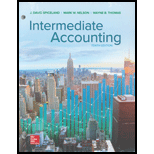
INTERMEDIATE ACCOUNTING <CUSTOM LL>
10th Edition
ISBN: 9781260887068
Author: SPICELAND
Publisher: MCG CUSTOM
expand_more
expand_more
format_list_bulleted
Concept explainers
Question
Chapter 8, Problem 8.14Q
To determine
Last-In, First-Out (LIFO): In Last-in-First-Out method, the cost of last purchased items are sold first. The value of the closing stock consists the initial purchased items.
To Identify: The two advantages of dollar-value LIFO compared with unit LIFO.
Expert Solution & Answer
Want to see the full answer?
Check out a sample textbook solution
Students have asked these similar questions
Solve with explanation and general accounting question
Hi expert please given correct answer
Solve with explanation and accounting question
Chapter 8 Solutions
INTERMEDIATE ACCOUNTING <CUSTOM LL>
Ch. 8 - Describe the three types of inventory of a...Ch. 8 - What is the main difference between a perpetual...Ch. 8 - The Cloud Company employs a perpetual inventory...Ch. 8 - The Bockner Company shipped merchandise to Laetner...Ch. 8 - What is a consignment arrangement? Explain the...Ch. 8 - Prob. 8.6QCh. 8 - The Esquire Company employs a periodic inventory...Ch. 8 - Prob. 8.8QCh. 8 - Its common in the electronics industry for unit...Ch. 8 - Explain why proponents of LIFO argue that it...
Ch. 8 - Prob. 8.11QCh. 8 - Describe the ratios used by financial analysts to...Ch. 8 - Prob. 8.13QCh. 8 - Prob. 8.14QCh. 8 - The Austin Company uses the dollar-value LIFO...Ch. 8 - Identify any differences between U.S. GAAP and...Ch. 8 - Determining ending inventory; periodic system ...Ch. 8 - Prob. 8.2BECh. 8 - LIFO method LO84 AAA Hardware uses the LIFO...Ch. 8 - LIFO liquidation LO86 Refer to the situation...Ch. 8 - Prob. 8.11BECh. 8 - Perpetual inventory system; journal entries LO81...Ch. 8 - Prob. 8.2ECh. 8 - Perpetual and periodic inventory systems compared ...Ch. 8 - Prob. 8.5ECh. 8 - Physical quantities and costs included in...Ch. 8 - FASB codification research LO82, LO83 Access the...Ch. 8 - Prob. 8.13ECh. 8 - Prob. 8.14ECh. 8 - Prob. 8.15ECh. 8 - Prob. 8.16ECh. 8 - Prob. 8.19ECh. 8 - Prob. 8.20ECh. 8 - Prob. 8.21ECh. 8 - Prob. 8.23ECh. 8 - Prob. 8.25ECh. 8 - Prob. 8.30ECh. 8 - Prob. 8.31ECh. 8 - Various inventory transactions; journal entries ...Ch. 8 - Prob. 8.3PCh. 8 - Prob. 8.4PCh. 8 - Various inventory costing methods LO81, LO84...Ch. 8 - Prob. 8.6PCh. 8 - Prob. 8.9PCh. 8 - Prob. 8.16PCh. 8 - Prob. 8.1DMPCh. 8 - Real World Case 82 Physical quantities and costs...Ch. 8 - Prob. 8.4DMPCh. 8 - Prob. 8.5DMPCh. 8 - Prob. 8.8DMPCh. 8 - Real World Case 89 Effects of inventory valuation...Ch. 8 - Communication Case 810 Dollar-value LIFO method ...Ch. 8 - Prob. 1CCTCCh. 8 - Prob. 2CCTC
Knowledge Booster
Learn more about
Need a deep-dive on the concept behind this application? Look no further. Learn more about this topic, accounting and related others by exploring similar questions and additional content below.Similar questions
- Boston Supplies had cash sales of $78,450, credit sales of $45,670, sale returns and allowances of $6,890, and sales discounts of $3,750. What is the company's net sales for this period?arrow_forwardWhat is the company's net sales for this period?arrow_forwardWhat is the primary purpose of preparing a trial balance? a) To calculate net profit or lossb) To check the mathematical accuracy of the ledger accountsc) To prepare the income statementd) To report cash flowsarrow_forward
- Machinery was purchased for $78,500 on January 1, 2018. Shipping costs were $2,200 and installation expenses totaled $4,300. It is estimated that the machinery will have a $15,000 salvage value at the end of its 8-year useful life. What is the amount of accumulated depreciation on December 31, 2020, if the straight-line method of depreciation is used?arrow_forwardI am trying to find the accurate solution to this general accounting problem with appropriate explanations.arrow_forwardWhat is the primary goal of financial management?A) Maximizing profitsB) Maximizing shareholder wealthC) Minimizing costsD) Ensuring liquidityarrow_forward
- Which of the following is NOT an example of an operating activity in cash flow statement? a) Receipts from customersb) Payments to suppliersc) Proceeds from issuing sharesd) Payments to employeesarrow_forwardCan you solve this general accounting problem using accurate calculation methods?arrow_forwardPlease provide the answer to this general accounting question using the right approach.arrow_forward
- The accounting equation is:a) Assets + Liabilities = Equityb) Assets = Liabilities + Equityc) Liabilities = Assets + Equityd) Assets + Equity = Liabilitiesarrow_forwardGeneral Accountingarrow_forwardThe primary objective of financial accounting is to:a) Provide management with detailed reports for decision-making.b) Help the company save taxes.c) Provide financial information to external users.d) Track inventory levels. need help!arrow_forward
arrow_back_ios
SEE MORE QUESTIONS
arrow_forward_ios
Recommended textbooks for you
 Cornerstones of Cost Management (Cornerstones Ser...AccountingISBN:9781305970663Author:Don R. Hansen, Maryanne M. MowenPublisher:Cengage Learning
Cornerstones of Cost Management (Cornerstones Ser...AccountingISBN:9781305970663Author:Don R. Hansen, Maryanne M. MowenPublisher:Cengage Learning Managerial Accounting: The Cornerstone of Busines...AccountingISBN:9781337115773Author:Maryanne M. Mowen, Don R. Hansen, Dan L. HeitgerPublisher:Cengage Learning
Managerial Accounting: The Cornerstone of Busines...AccountingISBN:9781337115773Author:Maryanne M. Mowen, Don R. Hansen, Dan L. HeitgerPublisher:Cengage Learning

Cornerstones of Cost Management (Cornerstones Ser...
Accounting
ISBN:9781305970663
Author:Don R. Hansen, Maryanne M. Mowen
Publisher:Cengage Learning

Managerial Accounting: The Cornerstone of Busines...
Accounting
ISBN:9781337115773
Author:Maryanne M. Mowen, Don R. Hansen, Dan L. Heitger
Publisher:Cengage Learning
